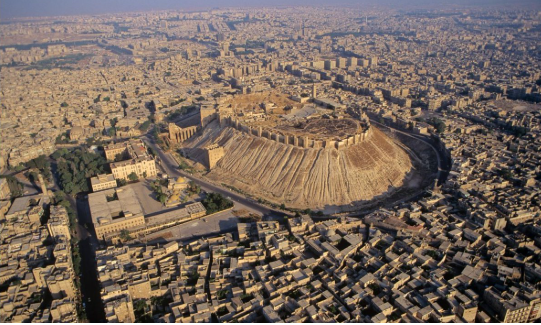Aleppo Governorate is located in northwestern Syria and is considered one of the largest Syrian governorates by area, covering approximately 18,482 square kilometers. Aleppo is renowned for its strategic location between East and West, serving as a prominent urban, economic, and historical center for thousands of years.
1. Historical Overview
Aleppo is one of the oldest continuously inhabited cities in the world, with its history dating back to the Neolithic period. Throughout history, Aleppo has been the cradle of many great civilizations, including the Canaanites, Assyrians, Hittites, Romans, and Byzantines. It also played a pivotal role in the Islamic conquest and was a significant commercial hub on the ancient Silk Road. The Ancient City of Aleppo is a UNESCO World Heritage site, encompassing historical and cultural landmarks of great importance, such as its old souks, citadels, and castles.
2. What is it Known For?
- Industry: Aleppo is Syria's foremost industrial center, housing numerous major factories in textiles, food products, chemicals, and footwear manufacturing.
- Trade: The old city's markets, like Souk al-Habaq and Souk al-Souf, are among the oldest and most famous markets in the Middle East.
- Agriculture: The governorate produces large quantities of grains such as wheat and barley, along with olives, fruits, and vegetables.
- Cultural Heritage: It boasts magnificent historical architectural landmarks, including ancient mosques, schools, and palaces that reflect the richness of its civilization.
3. Key Tourist and Historical Landmarks
- Citadel of Aleppo: One of the largest and oldest castles in the world, distinguished by its massive walls and famous tower.
- Ancient City of Aleppo: A labyrinth of narrow alleys and traditional souks that preserve the city's heritage.
- Great Umayyad Mosque: One of the most prominent Islamic landmarks in the city, characterized by Umayyad architecture.
- Clock Tower (Al-Manara): Located in Clock Tower Square and considered a symbol of the city.
- Armenian and Assyrian Churches: Reflect the religious and cultural diversity in Aleppo.
4. Geography and Climate
The governorate extends from the vast agricultural plains in the south to the Amanus Mountains in the north, which form a natural border with Turkey. The climate is temperate in the mountainous regions, while the plains experience a hot and dry Mediterranean climate in summer and cold and wet in winter. Rainfall typically occurs in winter and positively impacts agriculture.
5. Culture and Customs
Aleppo comprises a diverse cultural mix of Arabs, Kurds, Armenians, Syriacs, and others, giving it a unique cultural richness. Religious celebrations and occasions like Eid al-Fitr, Eid al-Adha, and Ramadan are accompanied by traditional folk events such as dances and popular songs. Aleppo is also famous for its rich Aleppian cuisine, known for traditional dishes like Kibbeh and Fatteh.
6. Economic Activities
Industry is the primary pillar of Aleppo's economy, producing various industrial goods that meet local market needs and export demands. Agriculture also plays a significant role, as the governorate is renowned for producing grains, olives, and fruits. Additionally, Aleppo maintains traditional handicraft industries such as carpet weaving and pottery.
7. Major Cities and Towns
- Aleppo (Capital)
- Manbij: An important agricultural and industrial center east of the governorate.
- Al-Bab: A historic city near the Turkish border.
- Azaz: Located north of the governorate on the border with Turkey.
- Al-Atarib: A small agricultural and industrial city west of Aleppo.
8. Infrastructure and Services
Aleppo boasts a major road network connecting it to all Syrian governorates, in addition to Aleppo International Airport, which is one of the country's most important airports. The governorate includes several public and private hospitals, as well as prestigious universities and colleges like Aleppo University, which offers high-quality education in various specializations. Schools and educational institutions are also widespread throughout the governorate, serving a large number of residents.
9. Current Situation and Challenges
In recent years, Aleppo has suffered extensive damage due to armed conflicts, particularly in the old city and industrial areas. The governorate faces challenges in reconstruction and rehabilitation of infrastructure, as well as the reintegration of residents and securing essential services like electricity and water. Governmental bodies and the international community are striving to support rebuilding efforts and improve the security and economic situation.
10. Prominent Figures
- Marwan Hadid: One of the most prominent contemporary Syrian writers and poets.
- Mohammed Al-Abed: A famous Syrian scholar and philosopher.
- Artist Sabah Fakhri: One of the most important singing voices in Arabic music.
- Prominent political and military leaders from the governorate.

